- Home
- Gerald Durrell
Menagerie Manor Page 3
Menagerie Manor Read online
Page 3
Outside, the lions, the dingoes and the fox are quiet; the owls keep up their questioning cries. There is a sudden chorus of hysterical screams from the chimpanzees’ bedroom and you know that they are quarrelling about who should have the straw.
In the Mammal House the gorillas are now asleep, lying side by side on their shelf, pillowing their heads on their arms. They screw up their eyes in your torch beam and utter faint indignant growls that you should disturb them. Next door, the orang-utans, locked passionately in each other’s arms, snore so loudly that it seems as though the very floor vibrates. In all the cages there is deep relaxed breathing from sleeping monkeys, and the only sound apart from this is the steady patter of claws as the nine-banded armadillo, who always seems to suffer from insomnia, trots about his cage, making and remaking his bed, carefully gathering all the straw into one comer, smoothing it down, lying on it to test its comfort, and then deciding that the corner is not a suitable one for a bedroom, removing all the bedding to the opposite end of the cage and starting all over again.
Upstairs, the flying squirrels gaze at you with enormous, liquid eyes, squatting fatly on their haunches, while stuffing food into their mouths with their delicate little hands. Most of the parrots are asleep, but Suku, the African grey, is incurably inquisitive, and, as you pass, never fails to pull his head out from under his wing and watch to see what you are doing. As you make your departure, he shuffles his feathers – a whispering silken noise – and then in a deep, rather bronchial voice says: ‘Good night, Suku,’ to himself in tones of great affection.
As you lie in bed, watching through the window the moon disentangling itself from the tree silhouettes, you hear the dingoes starting again their plaintive, flute-like chorus, and then the lions cough into action. Soon it will be dawn and the chorus of bird-song will take over and make the cold air of the morning ring with song.
CHAPTER TWO
A PORCUPINE IN THE PARISH
Dear Mr Durrell,
I would like to join one of your expeditions. Here are my qualifications and faults:
36 years old, single, good health, a sport, understand children and animals, except snakes; devoted, reliable, excellent; young in character. My hobbies are playing the flute, photography and writing stories. My nerves are not too steady; am disagreeable if anybody insults my country or my religion (Catholic). In the event of my accompanying you, if would be everything paid – on the other hand, if you are a snob and you don’t mean what you write, I regret to say I do not wish to know you. Hoping to hear from you soon...
I soon found, to my relief, that Jersey appeared to have taken us to its heart. The kindness that has been shown to us during the five years of our existence is tremendous, both from officials and from the Islanders themselves. After all when living on an island eight miles by 12 you may be pardoned for having certain qualms when someone wants to start a zoo and import a lot of apparently dangerous animals. You have vivid mental pictures of an escaped tiger stalking your pedigree herd of Jersey cows, of flocks of huge and savage deer browsing happily through your fields of daffodils and gigantic eagles and vultures swooping down on your defenceless chickens. I have no doubt that a lot of people thought this, especially our nearest neighbours to the Manor but nevertheless they welcomed us without displaying any symptoms of unease.
In a zoo of five or six hundred animals the variety and quantity of food they consume is staggering. It is the one thing that must not be stinted if they are to be kept healthy and happy; and, above all, the food must not only be plentiful, but good. Cleanliness and good food go a very long way to cutting down disease. A creature that is well fed and kept in clean-surroundings has, in my opinion, an 80 per cent better chance of escaping disease, or, if it contracts a disease, of recovering. Unfortunately, a great many people (including, I am afraid, some zoos) still suffer from the extraordinary delusion that anything edible but not fit for human consumption is ideal for animals. When you consider that, in the wild state, most animals - unless they are natural carrion feeders - always eat the freshest of food, such as fresh fruit and freshly killed meat, it is scarcely to be wondered at when they sicken and die if fed on a diet that is ‘not fit for human consumption’. Of course, in all zoos a lot of such food is fed, but in most cases there is nothing at all wrong with it. For example, a greengrocer opens a crate of bananas and finds that many of the fruit have black specks or blotches on the skin. There is nothing wrong with the fruit, but his customers demand yellow bananas, and will not buy discoloured ones. If a zoo did not buy it the fruit would be wasted. Sometimes the greengrocer has fruit or vegetables which have reached that point of ripeness where another 24 hours in the shop and the whole lot will have to be thrown away. In that case they are sold to a zoo that can use them up rapidly.
Some time ago a greengrocer telephoned us, inquiring if we would like some peaches. He explained that his deep-freeze had gone wrong and that it contained some South African peaches which had gone black just round the seed. There was absolutely nothing wrong with them, he reassured us, but they were unsaleable. We said we would be delighted to have them, thinking that a couple of crates of peaches would be a treat for some of the animals. A few hours later, a huge lorry rolled into the grounds, stacked high with boxes. There must have been anything up to thirty or forty, and the financial loss this represented to the greengrocer must have been staggering. They were some of the largest and most succulent peaches I have ever seen; we tipped cratefuls of them into the cages, and the animals had a field day. Within half an hour all the monkeys were dripping peach juice and could hardly move; several members of the staff, too, were surreptitiously wiping peach juice off their chins. There was, as I say, nothing wrong with the peaches: they were just unsaleable. But it might happen that someone else, in the most kindly way, would bring us a whole lorry load of completely rotten and mildewed peaches, and be hurt and puzzled when we refused them on the grounds that they were unfit for animal consumption. One of the biggest killers in a zoo is that rather nebulous thing called enteritis, an infection of the stomach. This, in itself, can cause an animal’s death, but even if it is only a mild attack it can weaken the creature, and thus open the door to pneumonia or some other deadly complaint. Bad fruit can cause enteritis quicker than most things; thus care must be taken over the quality of the fruit fed to the animals.
As soon as the people of Jersey knew what our requirements were in the matter of food, they rallied round in the most extraordinarily generous way. Take the question of calves, for instance. In Jersey most of the bull-calves are slaughtered at birth and, until we arrived, they were simply buried, for they were too small to be marketable. We discovered this quite by accident, when a farmer telephoned us and asked, rather doubtfully, if a dead calf was any use to us. We said we would be delighted to have it, and when he brought it round he asked us if we would like any more. It was then that we found out there was this wonderful source of fresh meat: meat which – from the animal point of view – could not have been more natural, for not only was it freshly killed (sometimes still warm), but they could also have the hearts, livers and other internal organs which were so good for them. Gradually, the news spread among the farmers, and before long - at certain times of the year - we were receiving as many as 16 calves a day, and farmers were travelling from one end of the Island to the other, delivering them to us. Other farmers, not to be outdone, offered us tomatoes and apples, and would bring whole lorry-loads round, or let us go to collect as many as we could take away. One man telephoned to say he had a ‘few’ sunflowers, the heads of which were now ripe, would we like them? As usual we said yes, and he turned up in a small open truck piled high with gigantic sunflower heads, so that the whole thing looked like a sun chariot. The heads were not fully ripe, which meant that the kernel of each seed was soft and milky; we simply cut up the heads as if they were plum cakes and put big slices in with such creatures as the squirrels, mongooses and birds. They all went crazy about the soft seeds and simpl
y gorged themselves.
But these are all the more normal types of food. In a zoo you can use a great many very unusual items of diet, and in acquiring these we were again helped by the local people. There was one elderly lady who used to cycle up to the Zoo once or twice a week on an antediluvian bicycle and spend the afternoon talking to the animals. Whenever she saw me she would back me into a corner and for half an hour or so tell me what tricks her favourite animals had been up to that day. She was, I discovered, a lavatory attendant in St Helier. One day I happened to meet her when I had been out collecting some acorns for the squirrels. She watched entranced while the squirrels sat up on their hind legs, twirling the acorns round and round in their paws as they chewed them. She then told me that she knew of a great many churchyards in which grew fine oak trees, and vowed that she would, herself, bring some acorns for the squirrels at the end of the week. Sure enough, on the Sunday she appeared, pedalling strenuously up to the Zoo on her ancient bicycle, the front basket of which was filled to the brim with plump acorns, and there was another large carrier-bagful strapped – somewhat insecurely – to the back of her vehicle. Thereafter, she used to bring us a regular supply of acorns every week, until the squirrels became quite blasé about them and even started to store them in their beds.
Another food item for which we are always grateful is what could be loosely called ‘live food’, that is to say earwigs, woodlice, grasshoppers, moths and snails. Here a great many people come to our rescue, and they turn up at the Zoo with jam-jars full of woodlice and other creatures, and biscuit-tins full of snails, of which they are, of course, only too glad to see the last. The earwigs, woodlice and so on are fed to the smaller reptiles, the amphibians and some of the birds. The snails we feed to the larger lizards, who scrunch them up with avidity, eating shell and all as a rule.
In order to pad out the animals that I had brought back from West Africa and South America, we had, of course, to acquire from different sources several other creatures. The most amusing of these was, undoubtedly, the bird I mentioned before, Trumpy, the trumpeter. Not only had he appointed himself the Zoo’s clown but also the Zoo’s settler-in. As soon as we got a new creature, Trumpy managed to hear of it, and would come bouncing along, cackling to himself, to settle it in. He would then spend 24 hours standing by the cage (or preferably in it, if he could) until he thought that the new arrival was firmly established, whereupon he would bounce back to his special beat in the Mammal House. Sometimes Trumpy’s settling efforts were on the risky side but he seemed to be too dim-witted to realise the danger. When Juan and Juanita, the white-collared peccaries, were first released into their paddock there was Trumpy to settle them in. The pigs did not seem to mind in the slightest, and so Trumpy did his 24-hour stint and departed. But later on, when Juan and Juanita had just had their first litter, and had brought them out into the paddock for the first time, Trumpy flew gaily over the fence to settle in the babies. Now, Juan and Juanita had not minded this for themselves, but they thought that Trumpy’s efforts on behalf of their piglets held some hidden menace. They converged on Trumpy (who was standing on one leg and eyeing the piglets benignly), their fur bristling, their tusks clattering like castanets. Trumpy woke out of his trance with a start, and only a skilful bit of dodging and a wild leap saved him. It was the last time he attempted to go into the peccary paddock. When we dammed up the little stream in the sunken water-meadow and constructed a small lake for the black-necked and coscoroba swans I had brought back from South America, Trumpy was there to supervise the work, and when the swans were eventually released he insisted, in spite of all our entreaties, on standing up to his ankles in water for 24 hours to settle them in. It did not appear to have any effect on the swans, but Trumpy enjoyed it.
Another new acquisition was the fine young male mandrill, Frisky. With his blue and red behind, and his blue and red nose. Frisky was a fine sight. If you went near his cage he would peer at you with his bright, amber-coloured eyes. lift his eyebrows up and down, as if in astonishment, and then, uttering throaty little grunts, he would turn round and present his backside to you, peering over his shoulder to see what effect his sunset-rear was achieving. Frisky was, of course, exceedingly inquisitive, like all members of his family, and one bright spring day this was his undoing. We were having the tops of the monkey cages repainted in a pleasant shade of mushroom, and Frisky had been watching this operation with the keenest interest. He was obviously under the impression that the paint pot contained some delicious substance, probably like milk, which would repay investigation. He had not had a chance to find out, however, for the painter, in the most selfish and boorish manner, had kept the paint pot close beside him. But patience is always rewarded, and after a few hours Frisky had his chance.
The painter left the pot unguarded while he went to fetch something, and Frisky seized the opportunity. He pushed his arm through the wire, grabbed the edge of the paint pot and pulled. The next moment he was spluttering and choking under a waterfall of mushroom-coloured paint, and almost instantly, he discovered, he had turned into a mushroomcoloured mandrill.
There was really not much that we could do, for you cannot take a half-grown mandrill out of its cage and wash it as though it were a poodle. However, when the paint had dried as hard as armour on his fur, he looked so miserable that we decided to put him into the next door cage, which contained a female baboon and two female drills, in the hope that they would clean him. When Frisky was let in with them, they viewed him with alarm, and it was some time before they plucked up enough courage to approach him. When they did, however, and found out what was the matter with him, they gathered round enthusiastically and set about the task of giving Frisky a wash and brush up. The trouble was that the paint had dried so hard on to the fur that the three females had to use a great deal of force, and so, although at the end of two days they had removed all the paint, they had also removed a vast amount of Frisky’s fur with it. Now, instead of a mushroom-coloured mandrill, we had a partially bald and slightly shame-faced looking mandrill.
Another newcomer was our lion, who went under the time-honoured name of Leo. He was one of the famous Dublin Zoo lions, and was probably about the fiftieth generation born in captivity. On his arrival he was only about the size of a small dog, and so he was housed in a cage in the Mammal House, but he grew at such a pace that it was soon imperative that we find him more spacious quarters. We had just finished construction on a large cage for the chimpanzees, and decided we would put Leo in that until we could get around to building him a cage of his own. So Leo was transferred, and settled down very happily. I was glad to see, when his mane started to develop, that he was going to be a blond lion, for in my experience the lions with blond manes, as opposed to dark manes, have always nice, if slightly imbecile, characters. This theory has been amply born out by Leo’s behaviour. He had in his cage a large log as a plaything, and a big, black rubber bucket in which he received his water ration. This bucket fascinated him, arid after he had drunk his fill he would upset the remains of the water and then pat the bucket with his great paws, making it roll round the cage so that he could stalk it and pounce on it. One day I was in the grounds when a lady stopped me to inquire whether we had acquired Leo from a circus. Slightly puzzled, I said, ‘No’, and asked her why she should think so. ‘Because,’ she replied, ‘he was doing such clever tricks.’ I discovered that he had, by some extraordinary means, managed to wedge the rubber bucket on his head, and was walking round and round the cage proudly, wearing it like a hat.
In his second year Leo decided, after mature reflection, that it was a lion’s duty to roar. He was not awfully sure how to go about it, so he would retire to quiet corners of his cage and practise very softly to himself, for he was rather shy of this new accomplishment and would stop immediately and pretend it was nothing to do with him if you came in view. When he was satisfied that the timbre was right and his breath control perfect, he treated us to his first concert. It was a wonderful moonligh
t night when he started, and we were all delighted that Leo was, at last, a proper lion. A lion roaring sounds just like someone sawing wood on a gigantic, echoing barrel. The first coughs or rasps are quick and fairly close together, and you can imagine the saw biting into the wood; then the coughs slow down and become more drawn out, and suddenly stop, and you instinctively wait to hear the thud of the sawn-off piece hitting the ground. The trouble was that Leo was so proud of his accomplishment that he could not wait until nightfall to give us the benefit of his vocal cords. He started roaring earlier and earlier each evening, and would keep it up solidly all night, with five-minute intervals for meditation in between each roar. Sometimes, when he was in particularly good voice, you could imagine that he was sitting on the end of your bed, serenading you. We all began to be somewhat jaded. We found that if we opened the bedroom window and shouted, ‘Leo, shut up,’ this had the effect of silencing him for half an hour; but at the end of that time he would decide that you had not really meant it and would start all over again. It was a very trying time for all concerned. Now, however, Leo has learnt to roar with a certain amount of discretion, but even so there are nights - especially at full moon - when the only thing to do is to put the pillow over your head and curse the day you ever decided you wanted a zoo.
We also obtained in our first year two South African penguins, called Dilly and Dally. I hasten to add that they were not christened by us, but arrived with these revolting names stencilled on their crate. We had prepared a pool for them in the shade of some trees bordering the main drive, and here they seemed quite content. Trumpy, of course, spent 24 hours in their pen with them, and seemed faintly disgruntled that the pool was too deep for him to join Dilly and Dally in it. After settling them in, he took a great fancy to the penguins and paid them a visit every morning, when he would stand outside the wire, making his curious booming cry, while Dilly and Dally would point their beaks skywards and bray to the heavens, like a couple of demented donkeys.

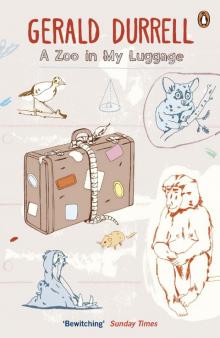 A Zoo in My Luggage
A Zoo in My Luggage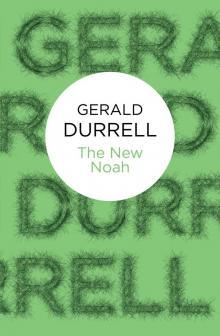 The New Noah
The New Noah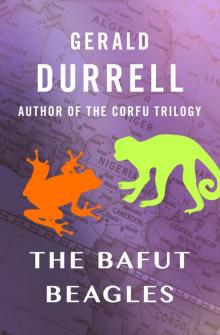 The Bafut Beagles
The Bafut Beagles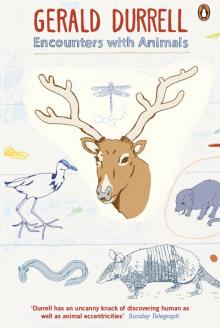 Encounters With Animals
Encounters With Animals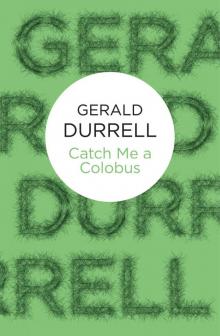 Catch Me a Colobus
Catch Me a Colobus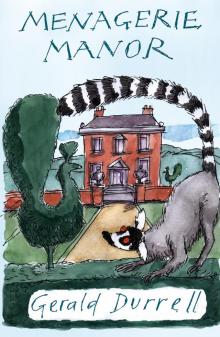 Menagerie Manor
Menagerie Manor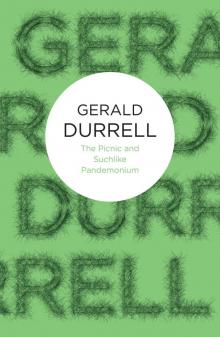 The Picnic and Suchlike Pandemonium
The Picnic and Suchlike Pandemonium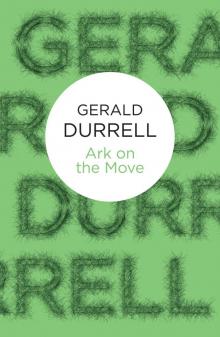 Ark on the Move
Ark on the Move My Family and Other Animals
My Family and Other Animals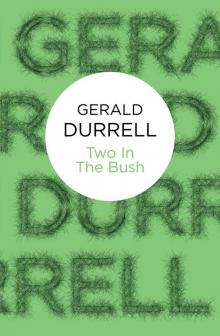 Two in the Bush (Bello)
Two in the Bush (Bello) The Stationary Ark
The Stationary Ark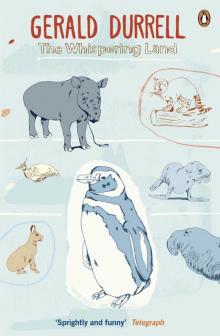 The Whispering Land
The Whispering Land Three Singles to Adventure
Three Singles to Adventure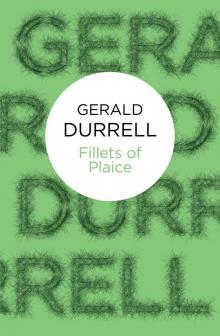 Fillets of Plaice
Fillets of Plaice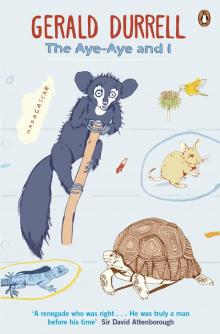 The Aye-Aye and I
The Aye-Aye and I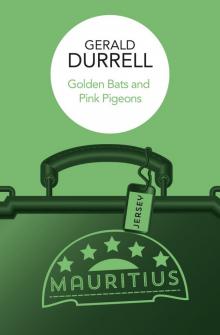 Golden Bats & Pink Pigeons
Golden Bats & Pink Pigeons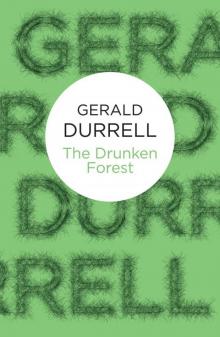 The Drunken Forest
The Drunken Forest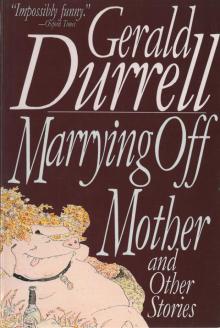 Marrying Off Mother: And Other Stories
Marrying Off Mother: And Other Stories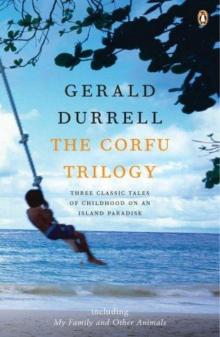 The Corfu Trilogy (the corfu trilogy)
The Corfu Trilogy (the corfu trilogy) The Corfu Trilogy
The Corfu Trilogy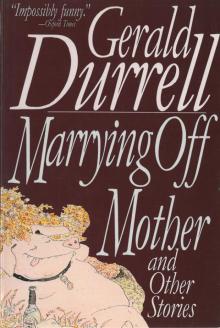 Marrying Off Mother
Marrying Off Mother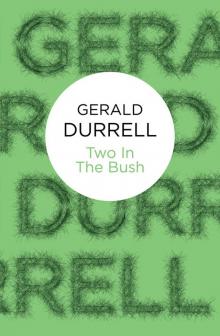 Two in the Bush
Two in the Bush